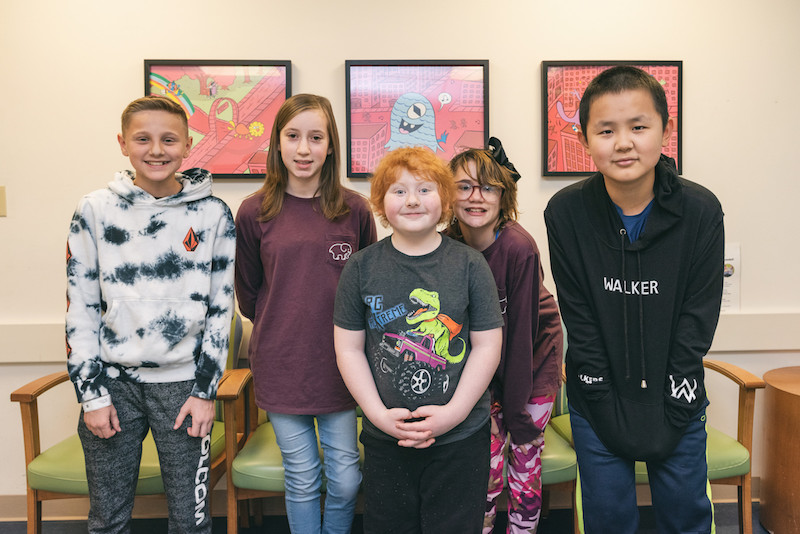Breadcrumb
- Home
- Programs & Services
- Bone and Soft Tissue Tumors Program
Programs & Services
The Bone and Soft Tissue Tumors Program provides comprehensive medical and surgical care for children and adolescents with bone and soft tissue tumors. We use the latest diagnostic and treatment approaches to ensure our patients’ health and well-being — now and well into adulthood.
What are bone and soft tissue tumors?
Bone tumors are masses that form within a bone. Soft tissue tumors are masses that form in the soft tissues: muscle, tendons, nerves, fat, blood vessels, and others.
The best treatment for a bone or soft tissue tumor depends on many factors, such as the type of tumor it is, where it’s located, and whether it’s benign (non-cancerous) or malignant (cancerous). We provide a full set of options that can be used to treat these tumors and will work with you find the best option for your child.
Below is a sample of the many bone and soft tissue tumors we treat.
Benign bone tumors
Malignant bone tumors
Benign soft tissue tumors
Malignant soft-tissue tumors

Adam takes a pause from his active life for non-ossifying fibroma
Adam was 11 in early 2024 when he and his bike slid under a downed tree. Such events aren’t unusual for Adam, who finds plenty of opportunities to test the limits of gravity near his home in Southern…

Generations of excellence in caring for childhood bone cancers: Dr. Gebhardt and Dr. Anderson
When Dr. Mark Gebhardt was a surgical resident at Boston Children’s Hospital in the early ’80s, doctors were just starting to use chemotherapy to treat bone cancers like osteosarcoma and Ewing…

Bone cancer surgery: A difficult choice
Nolan and Natasha might never have met if they hadn’t been diagnosed with bone cancer. Nolan, 13, is a natural athlete who lives in Maine. Natasha, 11, lives in Rhode Island and loves music and…
Why choose the Bone and Soft Tissue Tumors Program?
Research shows that children with bone and soft tissue tumors have better outcomes when they receive care from surgeons with expertise treating the type of tumor they have. At Boston Children’s our expertise is the result of specialized training and the large number of bone and soft tissue tumors we treat.
Our program is one of the nation’s largest referral centers for bone and soft tissue tumors: Physicians around the country and the world refer their patients to us for our expertise in this area. We’re also one of the few centers in the country with extensive experience in innovative techniques such as limb salvage surgery and rotationplasty that preserve leg function in children with a malignant bone tumor in or near their knee.
When a patient’s condition calls for it, we work closely with our colleagues in Dana-Farber/Boston Children's Cancer and Blood Disorders Center, a joint program that combines the pediatric expertise of Boston Children’s and cancer expertise at Dana-Farber Cancer Institute. Our two institutions are located on the same Boston campus and connected by indoor pedestrian bridges and tunnels.
Who will care for my child?
If your child has a bone or soft tissue tumor, we will connect you with the program that best suits your child’s needs. Once we’ve assessed your child’s condition, we’ll pull together a team of specialists, all of whom specialize in caring for kids.
If your child’s tumor is benign, their care will take place primarily through our Bone and Soft Tissue Tumor Program. If the tumor is malignant, our team will collaborate with experts in Dana-Farber/Boston Children’s Cancer and Blood Disorders Center on your child’s care.
Depending on your child’s needs, their care team may include:
- Orthopedic surgeons
- Oncologists
- Interventional radiologists
- Radiologists (diagnostic radiology)
- Pathologists
- General surgeons
- Nurses
- Psychosocial clinicians
- Physical therapists
- Rehabilitation medicine specialists
Frequently asked questions
You can contact either the Bone and Soft Tissue Tumors Program or Dana-Farber/Boston Children’s Cancer and Blood Disorders Center. In either case, a member of our team will help you schedule an appointment with the appropriate clinician.
Both benign and malignant tumors are caused by abnormal cell growth, however, benign tumors are not cancerous. Benign tumors tend to grow slowly and are not aggressive; in other words, they don’t expand into nearby tissues. Malignant tumors are cancerous and can spread to other parts of the body.
Doctors typically use a variety of methods to determine whether a tumor is benign or malignant. This often includes:
Many benign tumors do not need to be removed if they are not growing or compromising the strength of the bone or nearby tissue. Instead of surgery, your child’s doctor may recommend regular follow-up visits so they can monitor the tumor for changes over time.
Innovative care for bone and soft tissue tumors
Our ongoing research and innovation have advanced care for children with bone and soft tissue tumors. Below are some examples:
- Dana-Farber/Boston Children’s Cancer and Blood Disorders Center was one of the first childhood cancer care centers in the country to use adjuvant chemotherapy to perform limb salvage surgery for pediatric oncology patients with osteosarcoma, an aggressive bone tumor.
- Our center has been involved in a long-term follow-up study to learn about quality of life and outcomes for limb salvage surgery, rotationplasty, and amputation for children who have had sarcoma of the lower leg.
- Our team is researching the effectiveness of non-invasive vs. open treatments for aneurysmal bone cysts and Desmoid fibromatosis.
In addition to providing state-of-the-art multidisciplinary care, we incorporate genomic characterization of all bone and soft tissue tumors in order to advance knowledge and identify genetic alterations that could inform personalized precision treatments.

